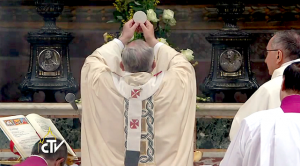I have previously argued here that because of the massive acceptance of contraception, and the implied right to sex-without-procreation, all the current attempts to block abortion and gay “marriages” are similar to rearranging the deck chairs on the Titanic. I concluded with the exhortation of Archbishop Chaput to priests, to overcome their fear of rejection and make the Catholic position regarding contraception clear in their homilies.
But I have begun to wonder, “in their homilies?” What Scriptural passages might be relevant? A priest has great flexibility in interpretation of the readings at Sunday Mass, but should not force an interpretation.
For example, I recall a homily by our former pastor on Lk. 2:17 about collecting the wheat but burning the chaff with “unquenchable fire” – as a lesson supporting “inclusiveness.” Another on Mt. 18:15-20, where Jesus tells his followers to treat some recalcitrant sinners as “heathens or publicans” – became an admonition to be “compassionate and forgiving.” A third on Mk. 1:21ff, where Jesus at a synagogue expels an unclean spirit – was turned into a condemnation of racism. (I forget the exact passage that prompted another parish priest to preach that Vatican II taught it is “no longer necessary to convert” people of other religions to Catholicism.)
But a conscientious priest willing to follow Archbishop Chaput’s advice would want to wait until the appropriate OT or NT reading came up in the Mass. For the priest’s “homily,” since Vatican II, and since papal directions concerning the Novus ordo missae, should be quite specifically oriented toward bringing out the meaning of the Scriptures.
In an editorial in the Homiletic and Pastoral Review, Fr. Kenneth Baker, S.J. raised the question, “Should Homilies Offer Systematic Instruction?” He points out that prior to Vatican II, bishops would often indicate topics for sermons in their dioceses, but that since Vatican II, the emphasis has been on Scripture, such that much of the Bible is presented Sunday by Sunday in three-year cycles.
How, then, does a pastor cover basic Catechetics within those guidelines? More specifically, Baker writes:
In the revised liturgy, how can the priest give a systematic, coherent presentation of Catholic teaching on the Creed, the Commandments, and the Sacraments within the course of the three-year cycle of scriptural readings?. . .There is little or no connection between the homilies from one Sunday to the next. As a result, more and more Catholics simply do not know what their Church teaches on such basic questions as original sin, mortal and venial sin, the Incarnation, the Trinity, heaven, hell, purgatory, the Real Presence, bodily resurrection, and so forth.
He mentions, however, that the Homiletic and Pastoral Review tries to incorporate such systematic instruction in the homilies that they regularly publish as a resource for preachers.

The Novus Ordo Mass is a result of changes originating at Vatican II, but drawing on calls for liturgical reform in previous decades. There was, reformers said, a lack of participation by congregations in the Mass (people just standing and kneeling, saying their rosaries, etc.); there were silent parts of the Mass, where the priest at the altar, with his back to the people, was reciting the Latin prayers for the “Ordinary” of the Mass; almost no one understood Latin, although they could follow translations in their Missals; and, shouldn’t liturgists try to revive the original practices of the early Church, as indicated in the New Testament letters and Patristic writings?
And there was the agenda of many periti at the Council – namely reunion with Protestants. There was great optimism that this ecumenical goal could be accomplished, and the initial move could be liturgical – removal of unessential elements in the Mass that could be an obstacle to reunion; concrete reminders of the “priesthood of the laity” and the idea of the “people of God”; emphasis on the Bible; and especially language echoing the common Protestant alternative to the Mass, the “Lord’s Supper.”
The Constitution on the Sacred Liturgy, Sacrosanctum concilium, of Vatican II, along with Pope Paul VI’s personal implementation of the directives of that Constitution, cleared the way for the use of the vernacular in the liturgy, as well as for replacement of the altar with a table for the “Lord’s Supper.” No special directives were given for the priest to face the congregation (coram populo) rather than facing the altar (ad orientem). But this practice rather swiftly became adopted during the 1970s along with the change from altar to table.
Many of us who have attended the Novus Ordo Mass since Vatican II are aware of numerous “liturgical additions” that went far beyond what the Constitution of the Liturgy or Pope Paul VI envisioned: namely, extensions of the Kiss of Peace with the priest walking throughout the church to greet people; extensions of the Prayers of the Faithful with a deacon passing around the church to gather personal prayers; the quite ordinary presence in the sanctuary of numerous “Extraordinary” ministers; children being invited to surround the altar during the Consecration; “inclusive” language throughout Mass, even when speaking of God (by avoiding the use of “He” or “Him;” and replacement of traditional hymns with songs emphasizing the horizontal aspects of community and presence at the Lord’s Supper, rather than the vertical relationship to God.
Fortunately, there are still parishes in which such “additions” do not prevail. But even in the context of a reverent Novus Ordo Mass, how is a priest to follow Archbishop Chaput’s exhortation to preach concerning contraception and other doctrines of Faith and morals?
As Father Baker indicates, it’s possible, with some planning, to coordinate catechetical instruction with Sunday homilies. But it should not be necessary, for example, to wait for a year before the relevant Scripture appears at Sunday Mass. More flexibility is necessary; and when urgent issues come to the fore, the priest should have the liberty of offering. . .an old-fashioned sermon.














